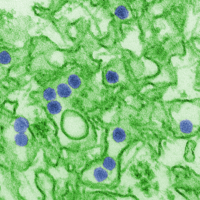
Photo from wikipedia
Aedes aegypti mosquitoes are vectors for arboviruses of medical importance such as dengue (DENV) and Zika (ZIKV) viruses. Different innate immune pathways contribute to the control of arboviruses in the… Click to show full abstract
Aedes aegypti mosquitoes are vectors for arboviruses of medical importance such as dengue (DENV) and Zika (ZIKV) viruses. Different innate immune pathways contribute to the control of arboviruses in the mosquito vector including RNA interference, Toll and Jak-STAT pathways. However, the role of cellular responses mediated by circulating macrophage-like cells known as hemocytes remains unclear. Here we show that hemocytes are recruited to the midgut of Ae. aegypti mosquitoes in response to DENV or ZIKV. Blockade of the phagocytic function of hemocytes using latex beads induced increased accumulation of hemocytes in the midgut and a reduction in virus infection levels in this organ. In contrast, inhibition of phagocytosis by hemocytes led to increased systemic dissemination and replication of DENV and ZIKV. Hence, our work reveals a dual role for hemocytes in Ae. aegypti mosquitoes, whereby phagocytosis is not required to control viral infection in the midgut but is essential to restrict systemic dissemination. Further understanding of the mechanism behind this duality could help the design of vector-based strategies to prevent transmission of arboviruses.
Journal Title: Frontiers in Immunology
Year Published: 2021
Link to full text (if available)
Share on Social Media: Sign Up to like & get
recommendations!